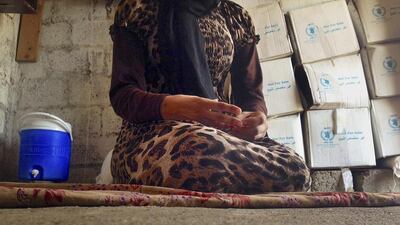BAGHDAD // Women and girls from Iraq’s Yazidi religious minority have said they were beaten and forced into sexual slavery by ISIL, with some being driven to suicide.
ISIL militants have overrun swathes of Iraq since June, declaring a so-called “caliphate” that also encompasses parts of Syria, and carrying out a litany of abuses in both countries.
The group has targeted Yazidis and other minorities in northern Iraq in a campaign that rights group Amnesty International has said amounted to ethnic cleansing, murdering civilians and enslaving others for a fate that some captives consider worse than death.
Hundreds — if not thousands — of Yazidi women and girls have been forced to marry, either being sold or given to ISIL fighters and their supporters.
One 19-year-old named Jilan committed suicide out of fear she would be raped, said a girl who was held with her but later escaped.
“One day we were given clothes that looked like dance costumes and were told to bathe and wear those clothes. Jilan killed herself in the bathroom,” said the girl.
“She cut her wrists and hanged herself. She was very beautiful; I think she knew she was going to be taken away by a man and that is why she killed herself.”
Another former captive said that she and her sister tried to kill themselves to escape forced marriage, but were stopped from doing so.
“The man who was holding us said that either we marry him and his brother or he would sell us,” said Wafa, 27.
“At night we tried to strangle ourselves with our scarves. We tied the scarves around our necks and pulled away from each other as hard as we could, until I fainted,” she said. Two other captives stopped them from dying.
These accounts were detailed in a report released on Tuesday by Amnesty.
“Many of those held as sexual slaves are children — girls aged 14, 15, or even younger,” said Donatella Rovera, Amnesty’s senior crisis response adviser, who interviewed dozens of former captives for the report.
Sixteen-year-old Randa was abducted with her family, then beaten and raped by a man twice her age. Her male relatives were killed.
The man “took me as his wife by force. I told him I did not want to and tried to resist but he beat me. My nose was bleeding, I could not do anything to stop him,” Randa said.
Some of the escaped victims said they were kept in family homes with wives, children, parents and siblings of the rapists.
ISIL has boasted in its propaganda magazine Dabiq of the horrors it has inflicted.
In an article entitled, “The revival of slavery before the hour”, Dabiq argues that by enslaving people it claims hold deviant religious beliefs, ISIL has restored an aspect of sharia — as interpreted by the extremist group.
The abductions and rapes cause long-term damage even to those who manage to escape.
“The physical and psychological toll of the horrifying sexual violence these women have endured is catastrophic,” Ms Rovera said.
“Many of them have been tortured and treated as chattel. Even those who have managed to escape remain deeply traumatised.”
One man said that he fears his wife, who escaped captivity, may commit suicide, and makes sure someone is with her at all times.
“My wife has panic attacks and can’t sleep. I can’t leave her alone because I’m afraid for her safety,” he said.
* Agence France-Presse

